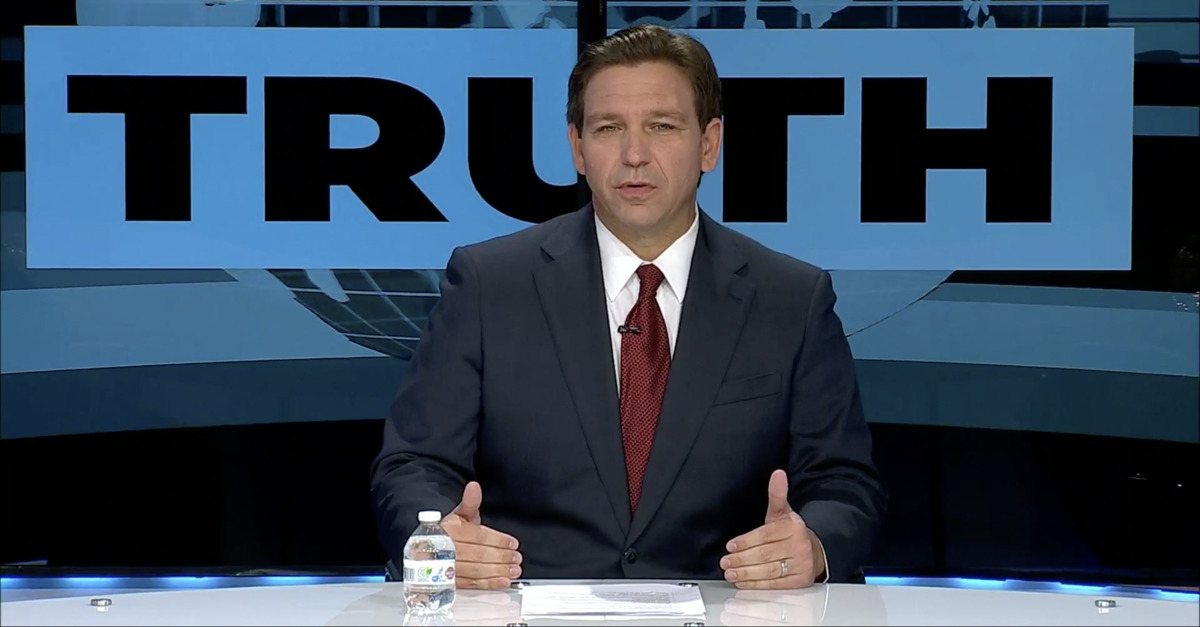
Fla. Gov. Ron DeSantis appears during a round table discussion on rolling back First Amendment protections in defamation law on Feb. 7, 2023.
A new bill introduced by an ally of Florida Gov. Ron DeSantis (R) explicitly aims to roll back First Amendment protections established in a landmark, decades-old U.S. Supreme Court case about defamation law. One of the leading First Amendment attorneys in the country says the Sunshine State effort is both futile and unconstitutional.
The bill, HB 951, aims to make defamation “purely” a state’s rights issue. It was filed in the Florida State House by Rep. Alex Andrade of Pensacola on Monday and appears to be the result of a recent push by the governor and his allies to lessen the rights established in the landmark 1964 case of New York Times Co. v. Sullivan.
First Amendment lawyer Floyd Abrams, who represented The New York Times in the famous Pentagon Papers case, said the legislation runs afoul of constitutional safeguards for the press.
“It’s black-letter law that a state cannot constitutionally provide less protection in libel litigation than the First Amendment requires,” he told Law&Crime in an email. “This text does just that, obviously intentionally.”
Abrams is the father of Law&Crime founder Dan Abrams.
“If Governor DeSantis, a Harvard Law graduate, thinks the statute is constitutional he’s forgotten what he was taught,” Abrams continued. “If he’s looking for a way to offer the Supreme Court a case in which it might reconsider settled law, who knows. But what’s clear is that it is today and tomorrow facially at odds with the First Amendment.”
Media lawyer and Fordham Law Professor Matthew Schafer called the legislation “an outgrowth of an earlier memo out of DeSantis’ office and a subsequent draft bill that was never introduced.”
The legislative language claims the bill is needed now because of “the widespread proliferation of defamatory falsehoods via new technologies and the ever-diminishing investigation and reporting standards of publishers.”
“Defamation is and should be purely a matter of state law,” the proposal says – explicitly referencing and taking issue with the Sullivan decision and its precedential “actual malice standard.”
Actual malice is the U.S. Supreme Court-created legal standard that governs defamation disputes when a high-profile person claims they have been libeled or slandered. Finding actual malice is a high bar and, when a judge determines that given plaintiff must prove actual malice, such a determination is often dispositive towards a dismissal.
The legislation criticizes the “federalization of defamation law,” and says that the standard “fails to acknowledge that defamatory falsehoods are equally injurious to plaintiffs regardless of whether they are public officials, public figures, or private figures, and regardless of whether the alleged defamatory falsehoods relate to matters of official conduct or of private concern.”
The law purports to severely limit who constitutes a public figure:
A person may not be considered a public figure for purposes of establishing a claim of defamation, including libel or slander, if his or her fame or notoriety arises solely from one or more of the following: (1) Defending himself or herself publicly against an accusation. (2) Granting an interview on a specific topic. (3) Public employment, other than elected office or appointment by an elected official. (4) A video, an image, or a statement uploaded on the Internet that has reached a broad audience.
The law also seeks to redefine the legal concept created by the nation’s high court by proposing that “failure to verify or corroborate an alleged defamatory statement” is “evidence of actual malice”
The bill further seeks to limit the use of anonymous sources, by declaring that a “statement by an anonymous source is presumed to be false in a defamation cause of action. Last year, DeSantis’ office reportedly worked on an abortive effort to introduce legislation that would have severely curtailed the use of anonymous sourcing.
While the legislation was introduced by Andrade, the bill itself echoes a roundtable discussion with legal experts and members of the media to discuss the impact of “media defamation.” Last year, DeSantis staffers began working on a proposal that aimed at undoing Sullivan’s key protections.
A spokesperson for DeSantis’ office pointed Law&Crime to governor’s recent round table discussion entitled Governor Ron DeSantis Hosts Roundtable Discussion on Legacy Media Defamation Practices.
“As a standard practice, we don’t comment on specific legislation that is still subject to the legislative process (and therefore different iterations) before it reaches the governor’s office in final form,” Executive Office of the Governor Press Secretary Bryan Griffin said.
During that round table discussion, DeSantis said: “We’ve seen over the last generation corporate media outlets, legacy media outlets increasingly divorce themselves from the truth, and instead try to elevate preferred narratives and partisan activism over reporting the facts. When they depart from the truth, a lot of times the truth’s on the cutting room floor, and the narratives they’re supporting and furthering actually damage a lot of people with lies.”